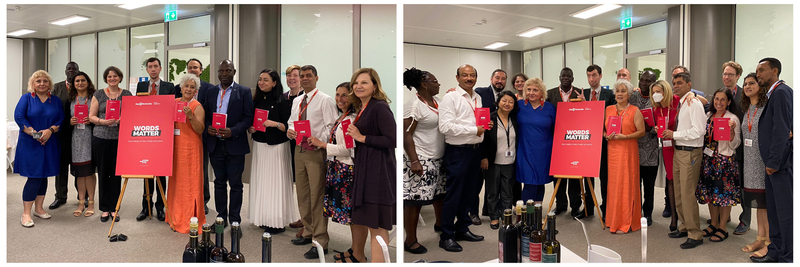
20 May 2022 I Geneva, Switzerland -- The Stop TB Partnership launched today an updated edition of its Language Guide, a flagship communications tool for everyone involved in the TB response: health care workers and providers, technical partners and donors, people who are recipients of TB services, TB policymakers, TB researchers, other stakeholders during the second day of its Board Meeting held on 19-20 May.
The new updated edition of the language guide, entitled “Words Matter” was needed to reflect new approaches, tools, drugs, diagnostics, and innovations now in use to combat TB. The update also takes account of dramatic shifts in thinking and evidence around human rights and gender that remain a priority for people affected by TB.
Words Matter, which was first published almost a decade ago, is considered a milestone publication for the TB Community. The publication is seen as a key instrument to encourage positive change, and sensitize and promote the appropriate language. It reflects the strong role words can play in our society to empower, end the stigmatization of affected people, and enhance empathy. The publication is also used as part of global efforts to change mindsets and encourage global participation needed to combat this deadly disease and reach the TB targets and goal to end TB in time for the 2030 deadline.
"Words Matter for me is one of those game-changers in the TB landscape because language puts our world into focus, gives structure to our thoughts and helps us to communicate effectively. So when we change our language, we change our thoughts and if the TB community wants to address social determinants and eliminate barriers to TB care including stigma, human rights, and gender and make it people-centered then we require a shared inclusive vocabulary. Words Matter,” said Austin Obiefuna, Stop TB Partnership Board Member – Vice-Chair.
The guide will further build capacity, sensitize, promote a shared vocabulary and shared commitment to innovation, human rights, gender equality, meaningful participation of people with TB in all parts of the response, and, most importantly help to empower people affected by TB. In doing so, Words Matter can contribute to the reduction of human rights barriers to accessing TB services or to completing TB treatment that result from stigma, discrimination, and also from a lack of information and understanding of TB terms and concepts.
“For too long we did not pay attention to how we speak about TB, about people infected and sick with TB, and about the type of treatment outcomes and different interventions. We did not address the fact that the way we speak can be stigmatizing, discriminatory, or non-inclusive. That can hurt, upset, and isolate people. We had the first language guide in 2012 and I am thrilled that our colleagues from civil society, communities, and TB survivors came together to update and change the language guide,” said Dr. Lucica Ditiu, Executive Director, Stop TB Partnership. “My hope is that every single one of us will read and embrace this guide and make the effort to change what has to be changed in our own language. Let us use the language guide and it will make each of us much better and, I strongly believe, our TB response will be the one we want.”
“Time brings new knowledge and attitudes. The tuberculosis community embraces this moment to update and share the vocabulary we use to express our current experience — every word not only counts, but they also matter,” said Paula Fujiwara Chairperson, Task Force and Writing Committee, Global Plan to End TB, 2023-2030.
'While Tuberculosis can attack any part of the body, the power of the spoken word can penetrate much deeper, and for many people have longer-lasting effects. Words Matter," said Peter Ngo'la Owiti, Stop TB Partnership Board Member – Affected Community.
The new edition was developed in close cooperation with key stakeholders from Civil Society, TB Affected Communities, Stop TB Community and NGO Delegations, and the members of the Global Plan 2023-2030 Taskforce.





